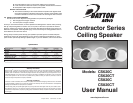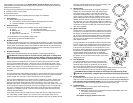
Contractor Series
Ceiling Speaker
www.daytonaudio.com
Warranty Information
Dayton Audio
®
products are constructed by industry experts, and are thoroughly tested before shipment.
Dayton Audio products are warranted for the period of one year. This warranty is limited to manufacturer
defects, either in materials or workmanship. Dayton Audio is not responsible for any consequential on incon-
sequential damage to any other unit or component or the cost for installation or extraction of any component
of the audio system. In the rare case of a product failure, please contact your place of purchase or call our
Customer Support Department at (937) 743-8248.
Warranty Limitations
There are no other warranties, either express or implied, which extend the foregoing, and there are no warranties
of merchantability or fitness for any particular purpose. The warranty will not cover incidental or consequential
damage due to defective or improper use of products.
This warranty gives you specific legal rights and you may also have other rights which vary from state to state.
Non-Warranty Service: If non-warranty service is required, the product may be sent to the Company for repair/
replacement, transportation prepaid, by calling (937) 743-8248 for details, complete instructions, and service
fee charges.
© Dayton Audio
®
Last Revised: 9/11/2012
● Check the balance control on the receiver. Make sure it is centered.
●
Loose connection at either the receiver or the speaker. Double check connections.
● Bad speaker cable. Replace suspect speaker cable.
Receiver cuts on and off:
● This could be caused by a short circuit between the positive and negative leads.
Check the connections at the back of the receiver, and then at the speaker; make
sure that no strands of wire from one connector are touching the other connector.
10) Caring For Your Ceiling Speakers
The two most common ways that ceiling speakers are permanently damaged:
1) Not enough power at higher volumes.
2) Too much power at higher volumes.
Contrary to conventional wisdom, far more speakers are damaged as a result of under-powering,
than by overpowering. When a receiver runs out of power, it still tries to reproduce the musical
signal by “clipping” the waveform. At high volume levels this clipping introduces gross amounts of
distortion to the speaker, eventually destroying it. If the sound from your ceiling speakers starts to
sound distorted, turn down the volume.
Having plenty of reserve power will help your speakers reproduce dynamic contrasts and quick
transients of music much more effectively, but you do have to exercise good judgment; too much
power will also permanently damage a speaker. Again, if you hear distortion, turn the volume down.
Specifications
User Manual
Model number CS620C CS620CT CS820C CS820CT
Description 8 ohm 70V / 8 ohm 8 ohm 70V / 8 ohm
70V Taps NA 0.62, 1.25, 2.5, 5, 10 W NA 0.62, 1.25, 2.5, 5, 10 W
Woofer 6.5" Poly cone 6.5" Poly cone 8" Poly cone 8” Poly cone
Tweeter 1" Mylar 1" Mylar 1" Mylar 1” Mylar
Frequency response (Hz) 60-20,000 60-20,000 50-20,000 50-20,000
Dimensions H x W x D (in) 8-1/2" dia x 2-3/4" 8-1/2" dia x 2-3/4" 10-3/4" dia x 3-5/8" 10-3/4” dia x 3-5/8”
Cut-out size H x W (in) 7-3/8" dia. 7-3/8" dia. 9-1/8" dia. 9-1/8” dia.
Power handling (RMS/Peak) 30/60 30/60 30/60 30/60
SPL (1W/1m) 88dB 88dB 89dB 89dB
Models: CS620C
CS620CT
CS820C
CS820CT




